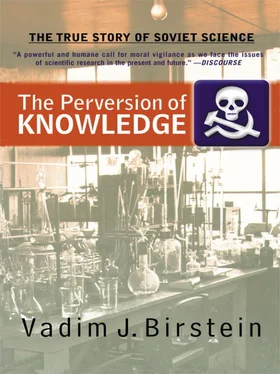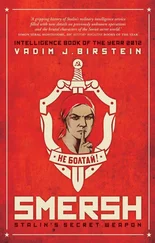SCIENTISTS WHO KNEW AND APPROVED
No official title or rank in Soviet society enjoyed greater prestige than that of akademik, full membership in the Academy of Sciences of the USSR. Anyone with this title could command an audience at meetings and publish articles in leading newspapers and journals without difficulty.
—L. R. Graham,
What Have We Learned About Science and Technology from the Russian Experience?
Deciding whether to take part in obvious crimes of the state is one of the main moral choices in the relationship between a scientist and a totalitarian state. Clearly, such involvement is immoral. A subtler problem comes up when it is necessary to approve an obvious crime. Secret scientists in the Soviet Union received scientific degrees. This means many people had knowledge of Mairanovsky’s crimes—members of closed scientific councils, the reviewers of his dissertation, and so on. All of them should be considered collaborators in his crimes. I think that this is a moral issue similar to that in Nazi Germany: Not only those doctors who used humans for experiments in concentration camps or ordered prisoners to be killed for their research were guilty; those who used the conditions of the regime to create a successful career were also guilty. Those involved in the crimes “were to a large extent people of long and high standing, university professors and academy members, some of them world famous, authors with familiar names.” 134If I did not know that Max Weinrich wrote these words in his book Hitler’s Professors , I would think that this was written about Mairanovsky’s supporters.
Mairanovsky himself named the supporters of his “scientific” career. Below is a translation of the last document in Memorial’s archival file on Mairanovsky. 135It is a copy of a letter dated May 18, 1964, addressed to the president of the USSR Academy of Medical Sciences in 1960–1968, Academician Nikolai Blokhin:
Dear N. N. Blokhin:
In June 1940, I successfully defended my Doctor of Sciences Dissertation entitled “Biological Activity of the Products of Interaction of Mustard Gas with Skin Tissues.” The defense took place at the VIEM. A. D. Speransky, N. I. Grashchenkov, G. M. Frank, B. N. Tarusov, and N. I. Gavrilov were my examiners.
Some details of the mechanism of toxic action of mustard gas on an organism (the pathology and disease development) were analyzed in the dissertation. As a result of the investigation of the mustard gas action I suggested reasonable methods of mustard gas therapy. The mechanism of mustard gas toxic action (its slow action, incubation period and the latent character of its action), general character of the effect (some kind of a “chain” reaction) during usage of a small quantity of the acting preparation has many characteristics in common with the action of malignant tumors.
These principles could be used as well for treatment of some malignant tumors.
The only preserved copy of my dissertation is coincidentally [!—V.B.] kept in KGB files by Professor V. Naumov. The other copies were barbarically destroyed during the time of Stalin’s Cult. All of my works connected with “mustard gas” were classified “secret,” although there was nothing secret in them.
Academician V. Sanotsky, who was present at my dissertation defense in 1940, knows my work well. If you are interested in my ideas on the therapy of malignant tumors, I ask you to request my dissertation “for permanent usage” at the following address: Moscow, the Chief of the Military Unit No. 10-55, V. Naumov. He will send it to you with pleasure for declassifying because he himself cannot do this.
I am head of a Biochemical Laboratory in Makhachkala now. In July I am going to be in Moscow and can meet you. Regretfully, I could not do this last year.
Sincerely yours, G. M[airanovsky]
On June 4, 1964, Dr. Blokhin replied, “If you are in Moscow, you can come in for a discussion of your question.” In a short letter to the Moscow News in 1990, Academician Blokhin wrote:
I was able to fulfill the request of my correspondent, and I offered to meet with him in Moscow. When we met, we discussed a plan of experiments and we planned to meet again in spring, 1965. This meeting did not take place since G. Mairanovsky passed away in December 1964.
The similarity in the action of mustard gas and malignant tumors on organisms, which was noted by G. Mairanovsky, has another side. The mustard gas analogs share a chemical basis with a whole group of preparations with anti-tumor action. Regretfully, G. Mairanovsky’s dissertation has not been known among specialists because of its secrecy. His ideas were not developed appropriately in his time. 136
Significant points in this correspondence include verification that the sole copy of Mairanovsky’s dissertation resided with a senior KGB officer, Mairanovsky’s old colleague Professor Naumov, who still headed a secret KGB laboratory, Military Unit No. 10-55. The president of the Academy of Medical Sciences, Academician Blokhin, who formally was not connected with the KGB, could order a copy of this top-secret dissertation from the organization that had almost unlimited power within the country and declassify it. Collaboration with the KGB, including collaborating on projects that involved the testing of fatal chemicals on humans, was typical for all scientific institutions in the former USSR and, indeed, was necessary to rise to the highest levels within the Academy of Sciences, the Medical Academy, or the university system.

Nikolai Blokhin, a supporter of Mairanovsky and president of the Medical Academy of Sciences, shown at a scientific meeting (1956). (Photo from the Russian State Archive of Cinema and Photo Documents [Moscow])
Academician Blokhin wrote his letter to Moscow News in 1990 as if he had never heard about the Nuremberg trial and Nazi doctors who experimented on humans with mustard gas exactly as Mairanovsky did. This is not surprising since Blokhin seems to have been one of the most obedient Soviet loyalists. In 1980, a long time after the end of his presidency (from 1960–1968), he signed one of the most scurrilous letters against Academician Andrei Sakharov published in newspapers just before the KGB exiled Sakharov to Gorky (Nizhnii Novgorod). 137
Who were the examiners of Mairanovsky’s dissertation? They, as well as the others present at Mairanovsky’s defense, were members of a closed scientific council allowed to know state secrets, including some secrets of the KGB. All of them understood very well what the “objects” of Mairanovsky’s experiments were, even if Mairanovsky himself did not mention the “objects.” I found all the examiners’ names, except N. Gavrilov, in the Great Soviet Encyclopedia and Great Medical Encyclopedia .

Aleksei Speransky, a member of both the Soviet and the Medical Academy of Sciences and one of the main supporters of Grigory Mairanovsky, shown with students (1952). (Photo from the Russian State Archive of Cinema and Photo Documents [Moscow])
Aleksei Speransky (1888–1961) was a pathologist and physiologist, as well as a member of the Academy of Sciences and Medical Academy of the USSR. 138From 1923 to 1928, he worked at Ivan Pavlov’s laboratory. Later, he headed pathology laboratories at the main institutes of Moscow and Leningrad, then became director of the Institute of General and Experimental Pathology of the USSR Academy. In 1950, he took an active part in the “discussions” at the “Conference on the Problem of the Vital Substances and the Development of Cells” 139and the “Pavlov Session” joint meeting of the Academy of Sciences and the Academy of Medical Sciences. 140These meetings, which demolished Soviet physiology, were a continuation of the Lysenko affair, which ultimately annihilated genetics and evolutionary theory in the Soviet Union. The “Pavlov Session” was organized under Stalin’s personal order by two Politburo members, Georgii Malenkov and Andrei Zhdanov. 141The latter was also in charge of Lysenko’s “August Session of 1948,” which destroyed Soviet genetics. Stalin himself edited texts of Lysenko’s speeches for the “August Session” on genetics and that written by Academician Konstantin Bykov for the “Pavlov Session.” 142
Читать дальше













